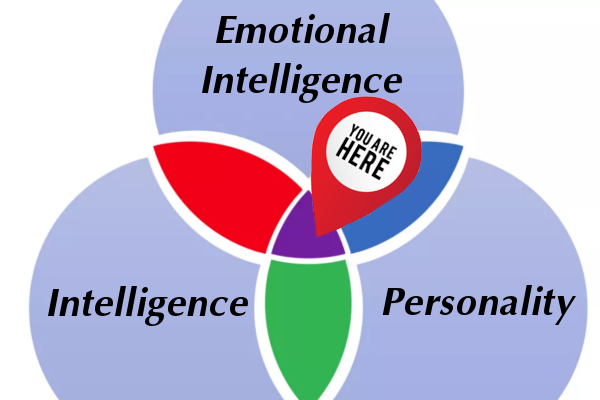Improv helps you develop your EQ (Emotional Intelligence)
noun: emotional intelligence
The capacity to be aware of, control, and express one’s emotions, and to handle interpersonal relationships judiciously and empathetically.
“emotional intelligence is the key to both personal and professional success”
Who are you? Who, who? Who who?
(Hint: It’s your IQ, Personality, and EQ)
You define your world through the three parts of “You” which combine to create a unique person. Think of yourself as a Venn diagram where three distinct circles overlap in the middle to explain who you are as a whole. Those three circles contain your Intelligence Quotient, Personality Type, and Emotional Intelligence. Where they overlap and the way they connect with each other creates a good model to understand who you are and how you interact with the world around you. Understanding how these three parts of you interact and how learning how you can develop your EQ are certain to have a significant impact on your success.
Everyone’s favorite graph: Your Venn Diagram
First, there’s your Intelligence Quotient (IQ). This defines your capacity to learn new things from books, training classes, etc. It’s your ability to reason and solve problems… it’s your “Wonk Factor”. Most researchers believe a person’s IQ is reasonably stable through adult life, it won’t move more than a point or two no matter what you do. Studying and learning will help make you smarter about those topics, but I’m sorry to report those brain training websites are unlikely to make your capacity to learn any better. You’re likely to be as Wonky today as you’ll ever be.
Second, there’s your Personality Type. I like to think of personality type as being a combination of Personality and Temperament. Temperament is like the canvas of a painting, it’s an inherited trait which creates the underlying fabric of who you are. Personality is what you as the artist have built on top of the canvas. No matter if you are a Bob Ross “wet-on-wet” landscape with tons of layers painted on top of each other or a Jackson Pollock “drip” painting with wild sprays of color everywhere, all the brush strokes come together to build the tinted glasses you see the world through. Most of the experts tell us that your personality type is inborn and does not change. Of course, you can train yourself to recognize areas of your personality where you want to act differently and train yourself how to act in a way that is contrary to your personality type. But at the end of the day, you are always going to interpret the world through your specific tinted glasses. Even if you’ve learned to act and react in a way that’s working better for you than what your base instincts are pushing you towards, you can’t change the color your glasses are tinted.
Third, there’s EQ, or your level of Emotional Intelligence. Psychology Today defines EQ as
“The ability to identify and manage your own emotions and the emotions of others. It is generally said to include three skills: emotional awareness; the ability to harness emotions and apply them to tasks like thinking and problem solving; and the ability to manage emotions, which includes regulating your own emotions and cheering up or calming down other people.” Personally, I like to think of EQ as, “your behavior towards yourself and others”.
And here’s the kicker: Your EQ is not set in stone by your childhood or genetic inheritance. EQ id the only part of who you are which can be changed through deliberate training and practice. But like anything that’s worth changing, it takes real work and dedication to make a change.
Be the change you want to see
Tomas Chamorro-Premuzicat writing for the Harvard Business Review says: Good coaching programs do work.
The metrics he’s found in his research are quite compelling. With a well-designed coaching program improvements of 25% can easily be achieved with the most coachable element of EQ, interpersonal skills, showing a 50% improvement in the short term. In his article he points out:
- Coaching around Psychological flexibility — the ability to accept and deal with (as opposed to avoiding) unpleasant situations — is effective
- No human behavior is unchangeable
- Good coaching programs do work.
- The benefits of EQ-coaching are not just confined to the workplace, they improve health, happiness, social interactions, and reduce stress
- The most important aspect of effective EQ-coaching is giving people accurate feedback
Improvisers need to develop their EQ
Granted, Improv is often seen as nothing more than a night out at a theater. We go to experience actors entertaining us with fun scenes based on suggestions which we, the audience, shout out to them. While that is certainly true, at ImprovThis we take having fun seriously. One way we do that is we teach how to use the “Three Pillars of Improv” in a way that improves your EQ.
In order for your night at the theater to be enjoyable, the Improv actors you’re watching have likely taken classes, worked with coaches, and rehearsed so they can build their EQ. Improv actors realize that their entire world is made up in the moment, based on a suggestion they received only seconds before. In order to make the show work, they need to be able to trust each other and handle the interpersonal relationships judiciously and empathetically. We’re not just talking about the characters in the scene’s relationships with other, but also the actor’s relationships with each other even when they’re not on stage.
You are an improviser everyday
Every non-scripted conversation you’ve ever had is you doing improv. Ok, you may not be on stage and you may not be trying to make an audience laugh in every conversation. But at the heart of it all, you are still talking another person. You’re still working with information you just received. You have no idea where the conversation will twist and turn. If you have a high EQ, it’s more likely that these conversations will flow smoothly and you’ll be building strong relationships.
Improv helps you develop your EQ (and strong relationships)
Speech communications classes, reading about what the great Dale Carnegie called “how to win friends and influence people”, and reading blogs like this are all great places to learn about communicating. Many people find role-playing is also an effective tool. All of those things and many more great tools exist. However, I’ve found Improv training to be one of the most effective tools to improve EQ in existence.
In our workshops, we engage teams who work together every day and teach them how to increase their EQ using the tools of the improviser. We do this by using fun activities and exercises which focus on specific parts of how to improve their interpersonal communication. We employ several exercises which have people slowing down their communication style so they get in touch with increasing their EQ. For example:
- Listening to understand rather thinking about how they are going to respond while the other person is talking
- Focusing on the person you are with right now and building a personal connection
- Filtering out all of the background noise that infects our daily lives and gets in the way of communicating effectively
- Paying closer attention to the body language of the person you are with and building the skills to interact with them in a way that has them feeling important and taken care of
- Suspending judgments of other people’s ideas and working with those ideas in an empathetic way
Using these skills on a daily basis will help to improve your EQ. But the real power of doing Improv training is that it is a format where your entire team can learn these skills together. Having your team work on exercises like these together can help them to recognize ways they can increase their the Emotional Intelligence across the organization. Taking that step in unison can have a profound impact on the culture of a corporate team.
What sets ImprovThis apart from the rest
Other companies who do improv training may do a great job of entertaining you and your team with a funny show. Often corporate training is a side business compared to their theater shows and comedy classes. We will be entertaining as facilitators, don’t you worry. But our focus is on helping you build a positive, creative, and passionate corporate culture.
At ImprovThis our sole mission is to create fun, hands-on workshop style training sessions to build closer, more collaborative teams. We also focus on working with your team so these skills are implemented after the workshop and provide tools to ensure the learning becomes part of the culture.
To learn more about ImprovThis or to schedule a time to talk to us, check us out at:
www.improvthis.com









